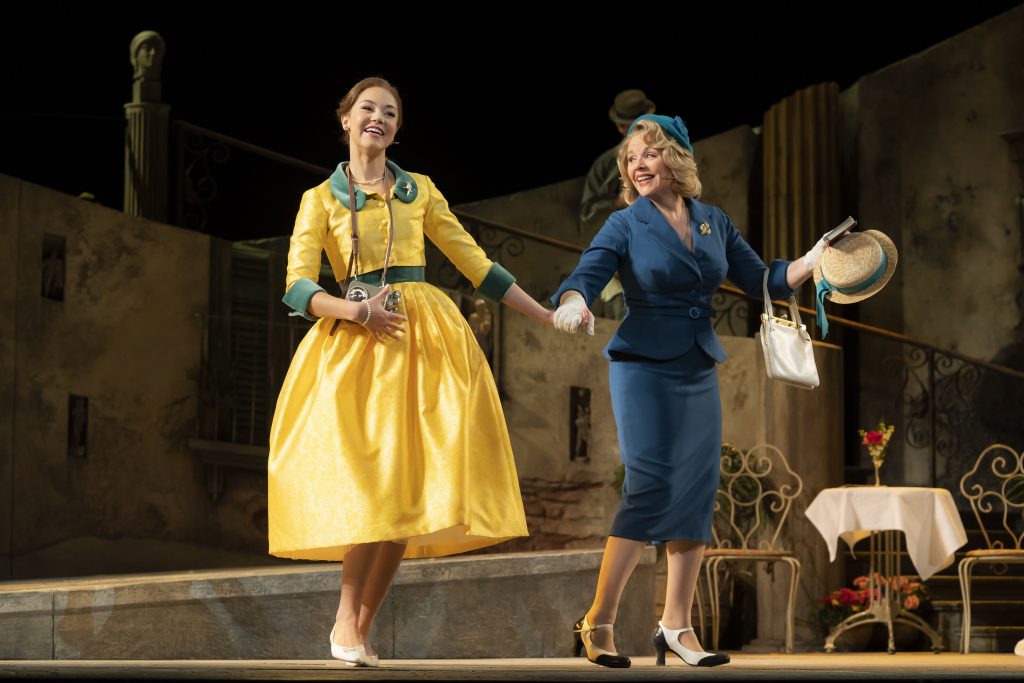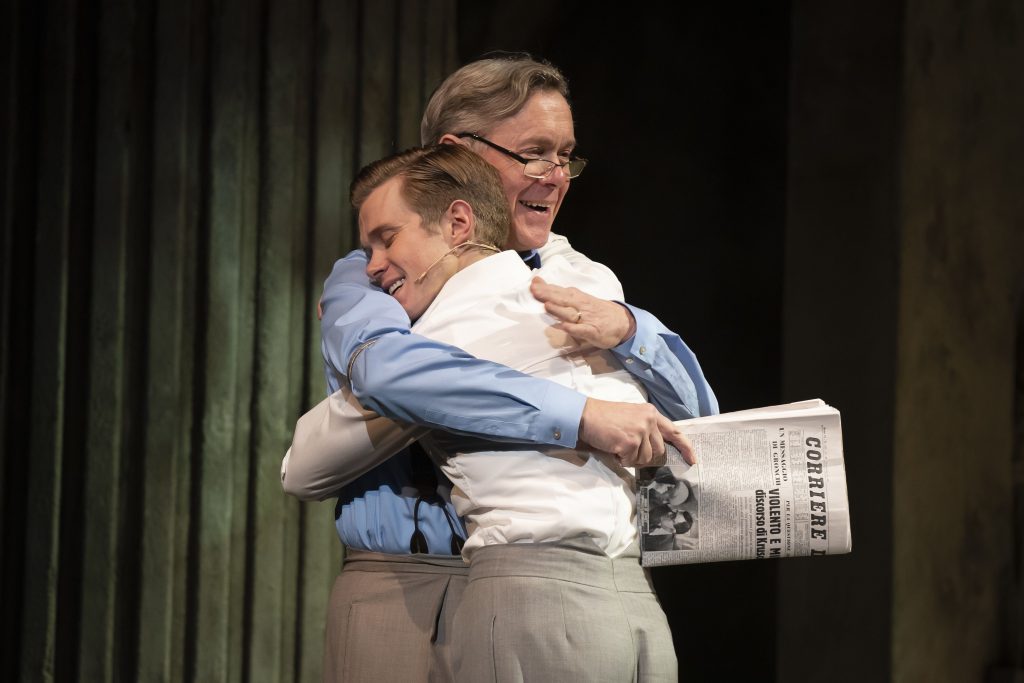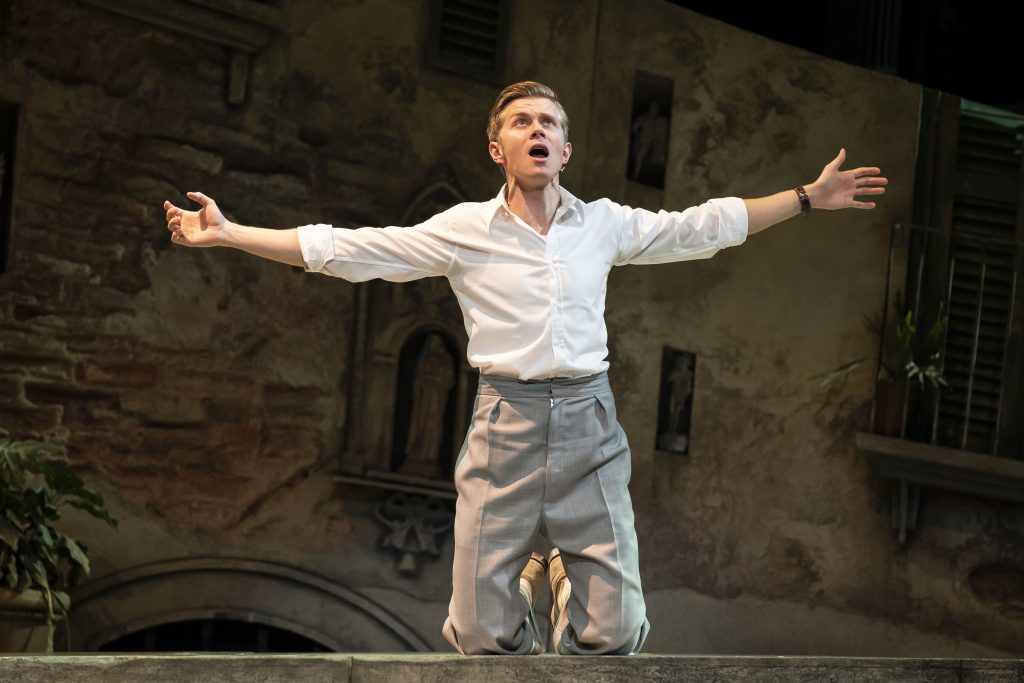
You don’t often hear about how enticing the story driving The Light in the Piazza eventually becomes. An unlikely love story viewed from the vantage point of an over protective mother; it’s so consciously refined that Piazza’s core message can be obscured in its romantic beauty. Very much in the way the love between Clara (Solea Pfeiffer) and Fabrizio (Rob Houchen) brings two worlds together, this staging of The Light in the Piazza merges opera and contemporary musical theater to show how determined people meet intimidating challenges.
This limited run production at the Lyric meticulously captures the feel of a time and place slightly removed from care. A Southern mother of means, Margaret Johnson (Renee Fleming), has taken her daughter on a trip to Italy. Her intent is to introduce Clara to a country she clearly loves while retracing a previous trip she had taken with her husband. The old-world glow pouring from the stage and the unhurried patina of a Florence moving at its own genteel pace created an alluring backdrop. One that was well suited to Brigitte Reiffenstuel’s casually luxurious mid-century costumes. Mississippian Elizabeth Spencer originally wrote The Light in the Piazza as a story for the New Yorker in 1960. Its strong appeal led to a successful movie starring George Hamilton two years later. But turning it into a lauded musical took much longer.

In this adaptation, the relaxed sensibility of the physical set extends to the work’s musical foundation. Despite its being sung in both English and Italian, it’s that easy accessibility and lack of formality that help make today’s Piazza more at home in the camp of musical theater than in the domain of opera. It took decades for Spencer’s story to make it to the world of music even though there’s long been an interest in doing so. It wasn’t until 1998 when composer/lyricist Adam Guettel, grandson of famed composer Richard Rogers, approached Spencer about taking it on and she agreed. Collaborating closely with the author throughout the adaptation, it’s Guettel’s vision, complemented with Craig Lewis’s writing, that the world is now enjoying and helped earn Piazza a Tony in 2005 for best original score.
Although there are hints of something uniquely uncommon in the love Clara and Fabrizio share; a sense of the dangerous or injurious lies at its center. There’s something about Clara that’s different from most people. It’s that insinuated secret that explains why her mother hovers over her so closely and causes you not to take this love story for granted. Why is she “not like other girls her age”?

During the first act, we’re introduced as much to the notion and essence of Italy as we are to the characters Spencer has created. Full of fire and intellect, Fabrizio’s family live beyond caricature. Drawn with confident suavity, Alex Jennings as Signor Naccarelli, who joined Ms. Fleming and Mr. Houchen in the original London cast, navigated the stage with the confidence of a lion. He symbolized a father who knew how to use both cunning and compassion to protect and guide his family. Both director Daniel Evans and movement director Lucy Hind can claim success in making the physical flow of the musical appear so naturally graceful. As it became more and more clear that Mrs. Johnson’s might fail in her efforts to stifle the romance between her daughter and the young Italian, the first act’s closing scene meant that hard choices must inevitably follow.

Up to this point, the music had been unequivocally pleasing; but safe. Operatic in the sense that the beauty of the voice prevailed, the music’s message was intended to nurture the romantic ideal. Even the orchestration was sublimated to allow the voice, through song, to lead the story. After Fabrizio learns the woman who accepted his marriage proposal has disappeared, everything changes. Mr. Houchen’s distraught solo introduced the fire of dramatic passion and a new boldness of theatricality. Both were invigorating and the sequence served to showcase the broad range and mellow richness of Houchen’s voice.

Ms. Fleming, who initially was concerned with mastering the greater amount of dialog this rendering of Piazza required, made an exemplary Margaret Johnson. Faced with a challenge that could end in triumph or tragedy, she had to trust her instincts as a mother to allow her daughter to at least have a chance of living a fully developed life; a life no one believed her capable of achieving.
It’s the stakes that help make The Light in the Piazza so interesting. When you take the story seriously, it flowers into something infinitely rewarding. Regardless of their backgrounds, all parents make conscious efforts to further the happiness and security of their children. Sometimes they even do so at the expense of their own marriage. This story, encased in music, shows how courage and growth can be inseparable.
The Light in the Piazza
Dec 14 – 29, 2019
Lyric Opera House
20 N. Wacker Drive
Chicago, IL 60606
312-827-5600
www.lyricopera.org